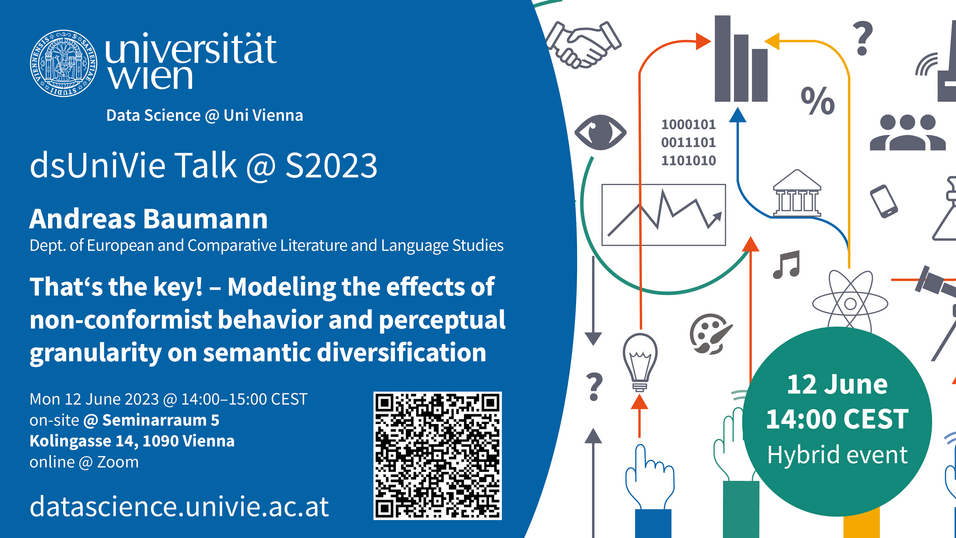Monday, 12 June 2023 @ 14:00 CEST
On-site:
University of Vienna
Seminarraum 5
Kolingasse 14–16
1090 Vienna
Online:
https://univienna.zoom.us/j/68108456728?pwd=SWhOczJxVG1qWlZQYXN6aC85TG81Zz09
Meeting ID: 681 0845 6728
Passcode: Ds&23
That's the key! – Modeling the effects of non-conformist behavior and perceptual granularity on semantic diversification
Abstract:
In natural language, lexical polysemy, i.e., the presence of multiple meanings for a single word form, is the rule rather than the exception. The word 'key', for instance can denote, among other things, an object to lock and unlock a door, a motile part on a device like a piano, or a solution to a problem. From a communicative point of view, the fact that one form refers to multiple meanings is, at first sight, sub-optimal given that ambiguity acts against successful communication. Yet, populations of speakers sustain a multitude of polysemous words in their communicative systems, viz., languages. Where does this semantic diversity come from?
One mechanism that was suggested to increase diversity in the domain of cultural evolution is that of non-conformist behavior, i.e., a bias for behaving differently than the majority does. Non-conformist behavior entails what is referred to as negative frequency dependence (i.e., an advantage of rare variants), a mechanism that was studied in depth in evolutionary biology. On the other hand, perceptual granularity (i.e., the ability to differentiate between variants) can impact semantic diversity. The goal of this paper is to identify conditions under which semantic diversity is enforced by these two mechanisms with the help of analytic models from mathematical biology. The predictions of these models are then tested against historical and contemporary language data on lexical polysemy.
Bio:
Andreas Baumann is senior scientist and coordinator for Digital Humanities at the Faculty of Philological and Cultural Studies at the University of Vienna. He has a background in Linguistics and Mathematics, and obtained his PhD in Cognitive Science, working on modeling evolutionary dynamics of phonotactics in English, Polish, and Afrikaans. He was visiting researcher at the University of Stellenbosch, the South African Center for Epidemiological Modeling and Analysis, and the University of Torino, and he is external lecturer at Adam Mickiewicz University Poznań. He was guest researcher at ACDH-CH from 2019 to 2021, and principal investigator in two projects on semantic and emotional dynamics in Austrian German. In his research, Andreas Baumann combines methods from mathematical (evolutionary) ecology, data science, and corpus linguistics to study the evolution, complexity and diversity of languages.

